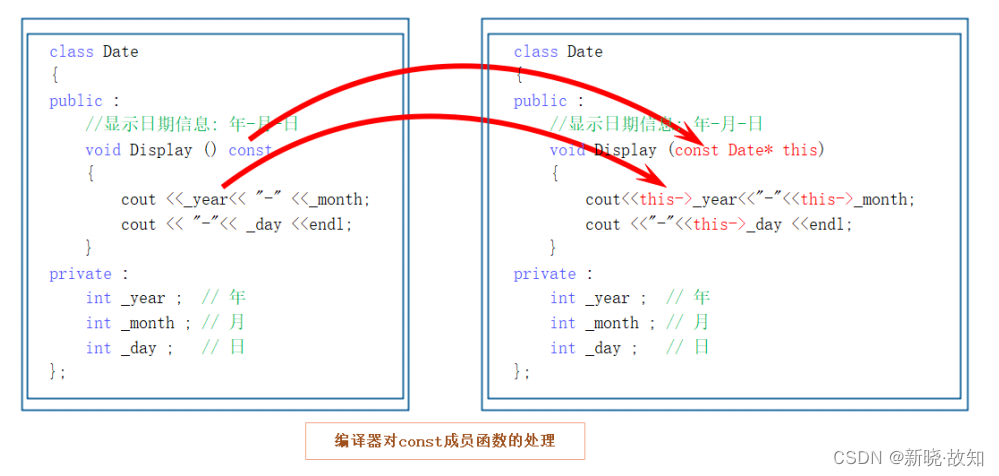目录
后记:●由于作者水平有限,文章难免存在谬误之处,敬请读者斧正,俚语成篇,恳望指教! ——By 作者:新晓·故知
5.赋值运算符重载
5.1 运算符重载
C++为了增强代码的可读性引入了运算符重载,运算符重载是具有特殊函数名的函数,也具有其返回值类型,函数名字以及参数列表,其返回值类型与参数列表与普通的函数类似。函数名字为:关键字operator后面接需要重载的运算符符号。函数原型:返回值类型 operator操作符(参数列表)
注意:
1.不能通过连接其他符号来创建新的操作符:比如operator@2.重载操作符必须有一个类类型或者枚举类型的操作数3.内置类型的操作符,其含义不能改变,例如:内置的整型+,不 能改变其含义4.作为类成员的重载函数时,其形参看起来比操作数数目少1成员函数的5.符有一个默认的形参this,限定为第一个形参6. .* 、:: 、sizeof 、?: 、. 注意以上5个运算符不能重载。这个经常在笔试选择题中出现。// 全局的operator== class Date { public: Date(int year = 1900, int month = 1, int day = 1) { _year = year; _month = month; _day = day; } //private: int _year; int _month; int _day; }; // 这里会发现运算符重载成全局的就需要成员变量是共有的,那么问题来了,封装性如何保证? // 这里其实可以用我们后面学习的友元解决,或者干脆重载成成员函数。 bool operator==(const Date& d1, const Date& d2) { return d1._year == d2._year && d1._month == d2._month && d1._day == d2._day; } void Test() { Date d1(2022, 7, 1); Date d2(2022, 7, 10); cout << (d1 == d2) << endl; }class Date { public: Date(int year = 1900, int month = 1, int day = 1) { _year = year; _month = month; _day = day; } // bool operator==(Date* this, const Date& d2) // 这里需要注意的是,左操作数是this指向的调用函数的对象 bool operator==(const Date& d2) { return _year == d2._year; && _month == d2._month && _day == d2._day; } private: int _year; int _month; int _day; }; void Test() { Date d1(2018, 9, 26); Date d2(2018, 9, 27); cout << (d1 == d2) << endl; }
内置类型,可以直接用各种运算符
自定义类型,不能直接用各种运算符,通过运算符重载使其能够使用各种运算符
5.2 赋值运算符重载
class Date { public: Date(int year = 1900, int month = 1, int day = 1) { _year = year; _month = month; _day = day; } Date(const Date& d) { _year = d._year; _month = d._month; _day = d._day; } Date& operator=(const Date& d) { if (this != &d) { _year = d._year; _month = d._month; _day = d._day; } } private: int _year; int _month; int _day; };赋值运算符主要有四点:
1. 参数类型2. 返回值3. 检测是否自己给自己赋值4. 返回*this5. 一个类如果没有显式定义赋值运算符重载,编译器也会生成一个,完成对象按字节序的值拷贝。class Date { public: Date(int year = 1900, int month = 1, int day = 1) { _year = year; _month = month; _day = day; } private: int _year; int _month; int _day; }; int main() { Date d1; Date d2(2018,10, 1); // 这里d1调用的编译器生成operator=完成拷贝,d2和d1的值也是一样的。 d1 = d2; return 0; }那么编译器生成的默认赋值重载函数已经可以完成字节序的值拷贝了,我们还需要自己实现吗?当然像日期类这样的类是没必要的。那么下面的类呢?验证一下试试?// 这里会发现下面的程序会崩溃掉?这里就需要我们以后讲的深拷贝去解决。 class String { public: String(const char* str = "") { _str = (char*)malloc(strlen(str) + 1); strcpy(_str, str); } ~String() { cout << "~String()" << endl; free(_str); } private: char* _str; }; int main() { String s1("hello"); String s2("world"); s1 = s2; }
6.日期类的实现
class Date { public: // 获取某年某月的天数 int GetMonthDay(int year, int month) { static int days[13] = { 0, 31, 28, 31, 30, 31, 30, 31, 31, 30, 31, 30, 31 }; int day = days[month]; if (month == 2 && ((year % 4 == 0 && year % 100 != 0) || (year % 400 == 0))) { day += 1; } return day; } // 全缺省的构造函数 Date(int year = 1900, int month = 1, int day = 1); // 拷贝构造函数 // d2(d1) Date(const Date& d); // 赋值运算符重载 // d2 = d3 -> d2.operator=(&d2, d3) Date& operator=(const Date& d); // 析构函数 ~Date(); // 日期+=天数 Date& operator+=(int day); // 日期+天数 Date operator+(int day); // 日期-天数 Date operator-(int day); // 日期-=天数 Date& operator-=(int day); // 前置++ Date& operator++(); // 后置++ Date operator++(int); // 后置-- Date operator--(int); // 前置-- Date& operator--(); // >运算符重载 bool operator>(const Date& d); // ==运算符重载 bool operator==(const Date& d); // >=运算符重载 inline bool operator >= (const Date& d); // <运算符重载 bool operator < (const Date& d); // <=运算符重载 bool operator <= (const Date& d); // !=运算符重载 bool operator != (const Date& d); // 日期-日期 返回天数 int operator-(const Date& d); private: int _year; int _month; int _day; };
7.const成员
7.1 const修饰类的成员函数
将const修饰的类成员函数称之为const成员函数,const修饰类成员函数,实际修饰该成员函数隐含的this指针,表明在该成员函数中不能对类的任何成员进行修改。
我们来看看下面的代码
class Date { public: void Display() { cout << "Display ()" << endl; cout << "year:" << _year << endl; cout << "month:" << _month << endl; cout << "day:" << _day << endl << endl; } void Display() const { cout << "Display () const" << endl; cout << "year:" << _year << endl; cout << "month:" << _month << endl; cout << "day:" << _day << endl << endl; } private: int _year; // 年 int _month; // 月 int _day; // 日 }; void Test() { Date d1; d1.Display(); const Date d2; d2.Display(); }请思考下面的几个问题:
1. const对象可以调用非const成员函数吗?2. 非const对象可以调用const成员函数吗?3. const成员函数内可以调用其它的非const成员函数吗?4. 非const成员函数内可以调用其它的const成员函数吗?
8.取地址及const取地址操作符重载
这两个默认成员函数一般不用重新定义 ,编译器默认会生成。class Date { public : Date* operator&() { return this ; } const Date* operator&()const { return this ; } private : int _year ; // 年 int _month ; // 月 int _day ; // 日 };这两个运算符一般不需要重载,使用编译器生成的默认取地址的重载即可,只有特殊情况,才需要重载,比如想让别人获取到指定的内容!

